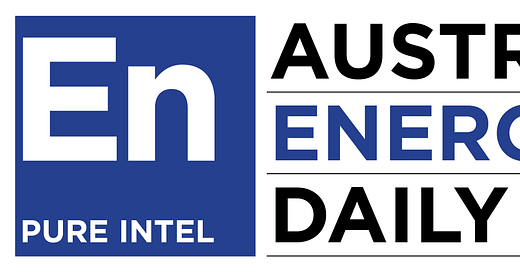
Forwarded from a colleague? 👨💻 Subscribe here
Good morning and welcome to day 37.
Today in summary: State energy ministers try to breathe new life into the now buried NEG; the local head of Pacific Hydro says Brazil has a more solid energy policy than Australia; and federal government data on Australia’s greenhouse emissions is late again.
— Charis
Current policy spin level: 💨 💨
State energy ministers are lining up to resurrect the reliability component of the NEG ahead of December’s COAG meeting. States could try to legislate the reliability mechanism themselves, in the absence of a federal policy. NSW, Queensland and Victoria indicated support, but said they were awaiting more clarity from the Morrison government. Politics is still driving the discussion: Victorian Energy Minister Lily D’Ambrosio told the Australian Financial Review
“we won't be rushed into supporting any half-considered proposals of the Commonwealth government".
Renewable projects in Australia aren’t looking as good to investors as those in other countries like Brazil and Chile, according to Pacific Hydro interim chief executive Rachel Watson. Pacific Hydro is pushing ahead with the request for approval for its 240 megawatt Prairie solar farm in Victoria, but Watson said the collapse of federal energy policy made it harder for projects like it to compete for funding.
"Without having a policy which encourages long-term investment and endures beyond 2020, we'll still have a choice whether to invest here or in one of the other markets we are in," Watson said.
Australia’s National Greenhouse Gas Inventory, a federal government database which tracks progress towards Australia’s 2020 emissions reduction target is running behind in publishing data. The government has yet to publish any emissions data for 2018. It published data for the 2017 calendar year in May showing 1.5% growth in emissions. The government not only delays releasing climate information, it also tries to bury it, according to the Climate Council, a climate change communications organisation that was reformed with donation funding after being abolished by the Abbott government.
“We’ve seen emissions data quietly released on Christmas Eve, or on a Friday evening, at a time it’s least likely to attract attention or scrutiny,” acting CEO Martin Rice said.
Geopolitics
The US is working with allies Australia, Japan and New Zealand to try and stop oil smuggling operations by North Korea. Faced with ongoing sanctions, North Korea has been sourcing oil from Russia and China, but the US says it is also engaging in ship-to-ship transfers of refined petroleum. “The United States has deployed aircraft and surface vessels to detect and disrupt these activities,” State Department spokeswoman Heather Nauert said in a statement.
The Commentariat
Federal Energy Minister Angus Taylor would be “well-served to follow his predecessor,” Josh Frydenberg, by engaging the COAG Energy Council to implement actions that will have a short-term impact on prices, while also maintaining reliability, writes the Grattan Institute’s Tony Wood. The recommendations contained in the Finkel Review, the NEG, and the ACCC’s July report into electricity affordability ought to “provide more than enough material” to get the job done.
Energy policy is being driven by beliefs that are out of touch with reality, writes the FT’s Nick Butler.
“When it comes to energy, the truth should be established by science and engineering but policy has in recent years been distorted by two things: misconceptions by the public and heavy weighting by lobbyists for vested interests. The result is both suboptimal and expensive.”
Three more things
Australia’s massive data centres are becoming the fastest-growing consumers of power in the country writes the Sydney Morning Herald’s Cole Latimer. The 107 data centres dotted around Australia now consume around the same amount of electricity as the 807 Coles supermarkets (which have an annual power bill of about $250 million) and Woolworths' 995 stores around the country combined.
UN leaders are meeting this week in New York and in attendance are businesses signed up to the UN Global Compact. The initiative encourages businesses to adopt sustainable and socially responsible policies, and report on their implementation. Speaking outside the meeting, the head of Iberdrola SA, the world’s biggest wind power producer said the company planned to spend about US$15 billion in the US on its transmission and distribution system and increase its renewable generation to around 10,000 megawatts (MW) by the end of 2022.
The US State of Arizona is proving an interesting case in emissions policy, with opposing lobbyists going head to head on a proposal to increase the state’s renewable energy portfolio standard to 50% by 2030. With gas, coal and nuclear all in the mix, it’s a fascinating story of a difficult transition.
This is an introductory service while we’re building a comprehensive daily paid online publication, coming in early 2019.
We’re not here to take sides, simply to cut through the noise, and help you make sense of the emerging policy and market trends you need to be across. We call it pure intel. You can read more about us here.


